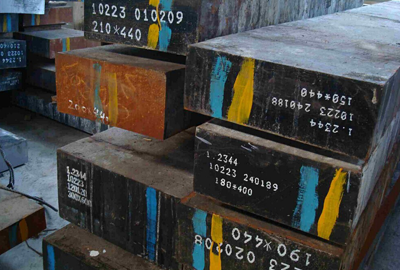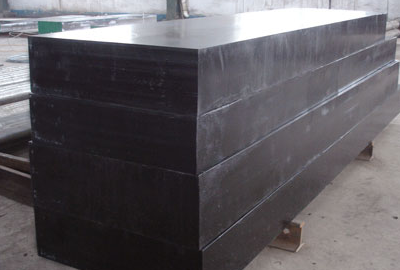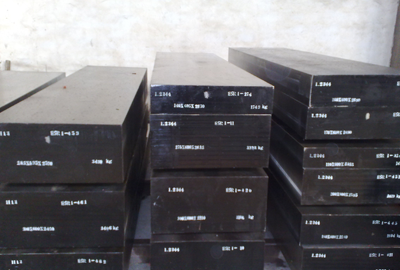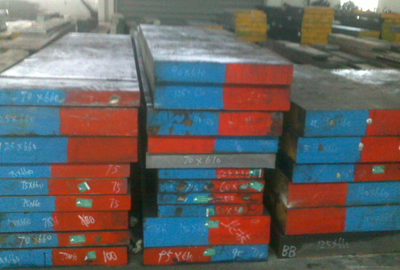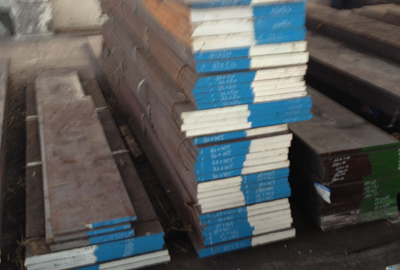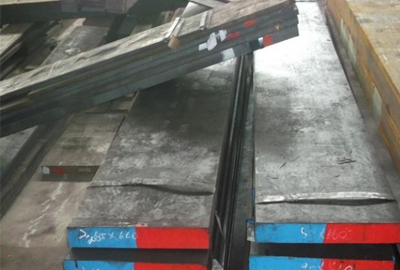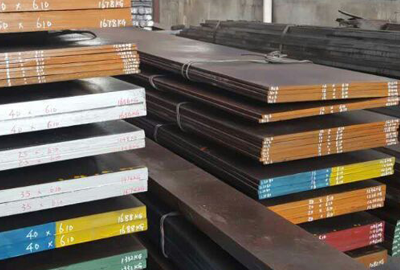Mat.No. 1.2344, DIN X40CrMoV51, AISI H13
Short Description:
Designation by Standards Mat. No. DIN EN AISI 1.2344 X40CrMoV51 X40CrMoV51 H13 Chemical Composition (in weight %) C Si Mn Cr Mo Ni V W Others 0.39 1.00 0.38 5.15 1.35 - 1.00 - - Description This alloy is one of the hot work, chromium type tool steels. It also contains molybdenum and vanadium as strengthening agents. The chromium content assists this alloy to resist softening if used at higher temperatures. Secondary hardening steels with good tempering reistance. It maintains ...
Product Detail
FAQ
Product Tags
Designation by Standards
| Mat. No. | DIN | EN | AISI |
| 1.2344 | X40CrMoV51 | X40CrMoV51 | H13 |
Chemical Composition (in weight %)
| C | Si | Mn | Cr | Mo | Ni | V | W | Others |
| 0.39 | 1.00 | 0.38 | 5.15 | 1.35 | - | 1.00 | - | - |
Description
This alloy is one of the hot work, chromium type tool steels. It also contains molybdenum and vanadium as strengthening agents. The chromium content assists this alloy to resist softening if used at higher temperatures. Secondary hardening steels with good tempering reistance. It maintains high hardness and strength at elevated temperatures. Good resistance to thermal fatigue, erosion and wear. Steel with very high thoughness and good ductilityand hardenability. Tools can be water cooled.
Applications
H13 finds applications for hot die work, die casting and extrusion dies, wear resisting tools, pressure die casting tools, pressing tools for light and heavy metal. For the highest requirements we recommended UTOPMO2 ESR EFS.
Physical properties (avarage values) at ambient temperature
Modulus of elasticity [103 x N/mm2]: 215
Density [g/cm3]: 7.78
Thermal conductivity [W/m.K]: 25.0
Electric resistivity [Ohm mm2/m]: 0.52
Specific heat capacity[J/g.K]: 0.46
Thermal conductivity [W/m.K]M
| 20oC | 500oC | 600oC |
| 25 | 28.5 | 29.3 |
Density [g/cm3]
| 20oC | 500oC | 600oC |
| 7.78 | 7.64 | 7.60 |
Electric resistivity [Ohm mm2/m]
| 20oC | 500oC | 600oC |
| 0.52 | 0.86 | 0.96 |
Specific heat capacity[J/g.K]
| 20oC | 500oC | 600oC |
| 0.46 | 0.55 | 0.59 |
Coefficient of Linear Thermal Expansion 10-6 oC-1
| 20-100oC | 20-200oC | 20-300oC | 20-400oC | 20-500oC | 20-600oC | 20-700oC | 20-800oC |
| 10.7 | 11.9 | 12.2 | 12.5 | 12.7 | 13.1 | 13.5 | 13.7 |
Continuous Cooling Transformation (CCT) Diagram

Click the image to enlarge the diagram.
Soft Annealing
Heat to 760-810oC, cool slowly in furnace. This will produce a maximum Brinell hardness of 229.
Hardening
Harden from a temperature of 1020-1060oC followed by oil, air quenching or warm bath (450-550oC). Hardness after quenching is 52-56 HRC.
Tempering
Tempering temperature: See the diagram bellow.
Tempering Temperature (oC) vs. Hardness (HRC) vs. Tensile Stregth (N/mm2)
| 100oC | 200oC | 300oC | 400oC | 500oC | 550oC | 600oC | 650oC | 700oC |
| 53 | 52 | 51 | 52 | 54 | 53 | 50 | 43 | 31 |
| 1845 | 1790 | 1730 | 1790 | 1910 | 1845 | 1680 | 1360 | 995 |
Tempering Diagram

Click the image to enlarge the diagram.
Diagram Tempering Temperature – Mechanical Properties

Click the image to enlarge the diagram.
Forging
Hot forming temperature: 1100-900oC.
Machinability
Machinability of H13 is medium to good. It rates as 75 % that of the W group water hardening tool steels which are low alloy and of generally good machinability.
Corrosion Resistance
This alloy has some corrosion resistance due to its chromium content. However it is still a steel and will rust unless given protective coating.
Welding
This alloy is weldable. Contact the alloy supplier for information on welding procedures.
Forms manufactured: Please see the Dimensional Sales Program.
Disclaimer
The information and data presented herein are typical or average values and are not a guarantee of maximum or minimum values. Applications specifically suggested for material described herein are made solely for the purpose of illustration to enable the reader to make his own evaluation and are not intended as warranties, either express or implied, of fitness for these or other puposes. There is no representation that the recipient of this literature will receive updated editions as the become available.
FAQ Content
![[0{7)7UAZ(]4W{5TSMC65Q7](https://www.htsteelmill.com/uploads/077UAZ4W5TSMC65Q7.png)
